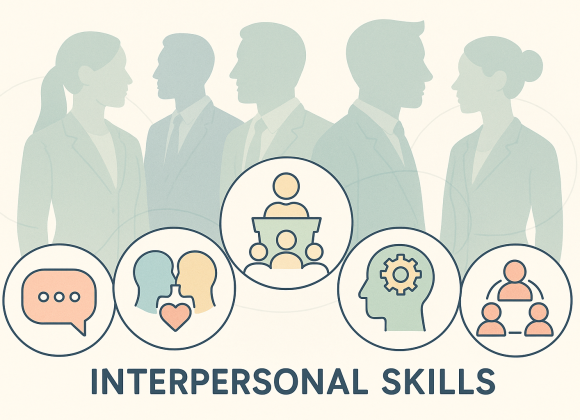Soft Skills vs. Hard Skills of Leadership
Soft Skills
Definition:
Soft skills are interpersonal abilities that enable effective communication, teamwork, and problem-solving, making them a vital counterpart to hard skills, which are technical and job specific. And soft skills focus on how you do it. In the workplace, top soft skills like empathy, adaptability, leadership and communication are increasingly valued. These important soft skills are essential for building strong relationships, fostering teamwork, and achieving success in both professional and personal settings. Together, soft skills vs. hard skills create a balanced skill set that drives individual and organizational growth.
Example:
- Communication
- Teamwork
- Adaptability
- Problem-Solving
- Empathy
- Time Management

Hard Skills
Definition:
Hard skills are technical, measurable abilities acquired through education, training, or experience. Employers value these skills for their clear, job-specific competence, such as programming, data analysis, or project management—top hard skills that are often essential for specific roles. There is a common difference about these soft skills focus on how you do it and the other-side hard skills focus on what you do. Hard skills are easier to quantify and often stand out in hiring processes, soft skills enhance workplace collaboration, adaptability, and overall success. Both soft skills vs hard skills are crucial, but improving hard skills through practice, training, and real-world application can complement your interpersonal abilities, creating a well-rounded professional profile. Measure both is key to thriving in today’s dynamic workplace.
Example:
- Programming (e.g., Python, Java)
- Data Analysis (e.g., Excel, SQL)
- Graphic Design (e.g., Adobe Photoshop, Illustrator)
- Project Management (e.g., Agile, Scrum)
- Financial Modeling (e.g., Excel, Bloomberg Terminal)
- Cybersecurity (e.g., Network Security, Ethical Hacking)
- Digital Marketing (e.g., SEO, Google Analytics)
- Engineering (e.g., CAD Software, Structural Analysis)
How to build Soft Skills
- Active listening: Focus on understanding others without interrupting, showing empathy.
- Communication skills: Improve clarity in verbal and written interactions.
- Teamwork: Collaborate, share ideas, and work toward common goals.
- Problem-solving: Approach challenges positively and learn from mistakes.
- Emotional intelligence: Manage emotions and build trust-based relationships.
- Networking and collaboration: Engage in networking events and team projects to boost interpersonal and communication skills.

How to build Hard Skills
- Set clear goals: Identify the hard skills you need based on your career goals and industry trends.
- Pursue relevant training: Enroll in courses or certifications to build foundational knowledge and hands-on experience.
- Practice regularly: Dedicate time to hands-on projects, problem solving, or simulations to strengthen your skills.
- Leverage online tools: Use tutorials, video lectures, and coding platforms to explore new concepts and techniques.
- Work on real-world projects: Apply your skills to real tasks or volunteer work to gain experience and build your portfolio.
- Seek feedback and guidance: Ask peers, mentors, or industry experts for advice to improve and refine your abilities.
What Employers Really Want Now?
The hiring landscape is undergoing a fascinating shift. Traditionally, hard skills—making easy to measurable qualifications like certifications, degrees, and technical expertise—were prioritized. These skills were straightforward to verify and assess. However, a change is being noticed. Forward-thinking organizations are now recognizing the importance of soft skills in the workplace. While technical expertise is still valued, human skills like emotional intelligence, initiative, and effective communication are being sought more than ever. Research shows these qualities often distinguish good hires from exceptional ones.
Whatever the balance between soft skills vs. hard skills, it is evolving. Employers are increasingly valuing professionals who combine technical abilities with strong interpersonal capabilities. This shift highlights the growing importance of human skills in creating a thriving workplace.

Why are both Hard and Soft Skills important in the Workplace?
Having both hard and soft skills is like having the perfect combination of knowledge and adaptability—both are essential for long-term success.
Think of hard skills as the technical expertise that gets your foot in the door. These include certifications, specialized training, and industry-specific abilities that help you perform your job. A software developer needs programming skills, a graphic designer must master design tools, and an accountant requires financial expertise. These are the measurable skills that ensure tasks are completed efficiently and correctly.
But here’s where soft skills make all the difference. While hard skills enable you to do the job, soft skills determine how well you collaborate, lead, and navigate challenges. Effective communication, teamwork, leadership, problem-solving, and emotional intelligence set great professionals apart from the rest.
Take a chef, for example. Having expert culinary skills is crucial to creating delicious dishes, but what makes a chef truly outstanding? It’s their ability to lead a kitchen team, handle stressful situations with composure, and communicate effectively with staff. Without strong soft skills, even the most talented chefs may struggle to manage a kitchen efficiently.
In today’s fast-paced professional world, technical expertise alone isn’t enough. The ability to work well with others, adapt to changes, and think critically in high-pressure situations is what leads to long-term career success. When you master both hard and soft skills, you don’t just complete tasks—you innovate, inspire, and leave a lasting impact in your field.




